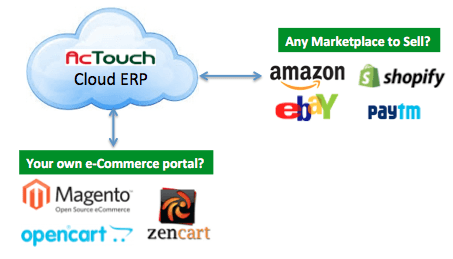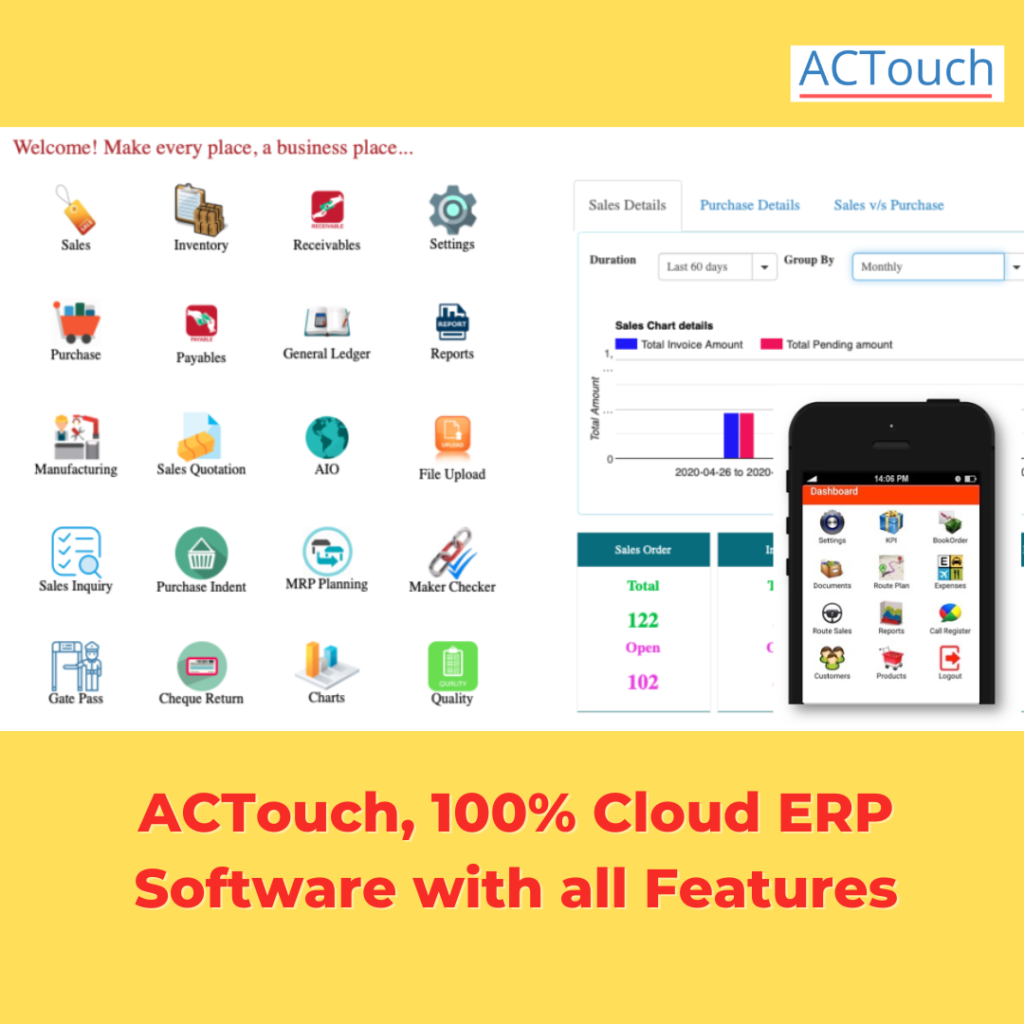Selecting ERP Systems with ERP Vendor Selection Checklist
Today there are 100’s of ERP systems in the Market and everyone claims they are the best. So the question comes is how we are selecting ERP Systems?, About the process of ERP Vendor Selection and How we choose the right one for our business? Because selecting an ERP Systems requires huge amount of work, analysis and plan. Because Enterprise resource Planning (ERP) helps business to streamline its process, build control and measures. So it’s a valuable tool for the success of business.
Many ERP (Enterprise resource planning) solutions helps to streamline Purchase, Sales, Payments and Receipts. But some advanced Cloud ERPs like ACTouch.com, SAP, Oracle Apps etc have the Planning, Manufacturing, Supply chain management etc. There are few software search tools have listed few ERP Software solution. But what is important is do we have a checklist to follow? There are many parameters to check before you finalize the ERP solution for your company. Since deploying an ERP is a time consumed and expensive, its better to be careful rather than repent later. 
Selecting the Right ERP & ERP systems process.
Based on our experience and what we learnt from our customers, we list the following.
Step 1 – Prepare yourself.
- Do a list of the features that you need based on your business practices and needs
- Find those “Must haves” and “Good to have” features
- Identify who is leading the vendor selection process in your organization
- Identify the stakeholders who are the decision makers in the ERP Software selection process. Spend time to review the document and get an approval from senior management.
- Are you going to send an RFP? If so, prepare the questions and get it approved by management
- Identify the potential ERP solutions that you want to evaluate.
- Do a basic research on these ERP solution, as the selection process would be faster. This also saves time during vendor comparison.
- Speak to your vendors, customers to know the ERPs in the market and how its support, ability to customize and deployment etc.
Create Sales Order and Sales Invoice with ACTouch Cloud ERP.
Selecting ERP Systems: Who owns customer success?
This is an important factor. Many large ERPs like SAP, Oracle Apps etc sell the license to customers, while their partners do the implementation, support etc at a cost. What is interesting here is WHO OWN customer success? Is it the author of ERP or Partner. We have heard of many cases where after years of struggling with implementation customer dropped the ERP as their vendor couldn’t complete the implementation.
Selecting ERP Systems: What is Vendor capability and financial status? How to Compare ERP vendors?
This is another important factor, as you need to know how the vendor will survive and support you for a long time.
- What is an ERP Vendor?
- How to compare ERP Vendors?
- How much vendor knows your business verticals?
- How long the company is in survival
- Did they implement ERP at similar customers and of size, so that learning curve is reduced at your implementation?
- What is the future plans and direction of vendor and its flagship product.
- Are they technology savvy to make new improvements?
Selecting ERP Systems
This is an important factor as many business budgets are restricted and its essential for the selection team to work within the same boundaries.
- What type of ERP Systems you need? Do you need Local server based or Cloud Based?
- Any restriction of application like ERP Systems to be made available only at Local machine?
- Any existing in-house IT team to manage application, it’s back-up and maintenance done? Who is doing it now?
- What is the true cost of an ERP Systems like License Costs, Hardware and networking costs, Implementation costs, customisation costs, new software license costs etc.
- Identify any hidden costs as this could be a surprise for you.
Selecting ERP Systems: How is the system functionality and ease of use?
- Is the new features addresses the current challenges faced by Company or not?
- How its easy to use the application?
- Does it require an extensive training or can I enable my employee with in an hour?
- Is the vendor ready to customize the workflows or not?
- Do an actual business lifecycle on ERP and seek answers for all. Complete the product demo and do a proof of concept.
- Involve all the stakeholders
- Document everything question and replies as this could help you to solve the problems at later stages.
ERP Vendor Selection Criteria.
Selecting the right Enterprise Resource Planning (ERP) vendor is a critical decision for any organization. ERP systems are integrated software solutions that manage various business processes, including finance, human resources, procurement, manufacturing, sales, and more. The selection process involves evaluating various vendors and their offerings to find the one that best aligns with the organization’s needs and objectives.
Here are some key criteria to consider when selecting an ERP vendor:
-
Functionality and Features:
- Does the ERP system offer the specific features and functionalities required by your business? Ensure that the system can address your industry-specific needs and can handle various business processes.
- Check if the ERP system covers core functions like financial management, inventory management, procurement, manufacturing, sales, customer relationship management (CRM), and human resources (HR).
-
Scalability:
Consider your organization’s growth plans. Will the ERP system be able to accommodate your future expansion needs in terms of user count, transaction volume, and additional functionalities?
-
Customization and Flexibility:
Can the ERP system be tailored to your specific business processes without significant difficulty? Flexibility is important to ensure the system aligns with your unique workflows.
-
Integration Capabilities:
Evaluate the ERP system’s ability to integrate with other software applications you are currently using, such as CRM, e-commerce platforms, or business intelligence tools.
-
Ease of Use and User Experience:
The system should have an intuitive interface that requires minimal training for your staff to start using it effectively.
-
Vendor Reputation and Experience:
Research the vendor’s reputation in the industry. How long have they been in business, and do they have a track record of successful implementations?
-
Support and Maintenance:
What type of customer support does the vendor provide? Consider factors like response time, availability of technical support, and ongoing maintenance.
-
Total Cost of Ownership (TCO):
Beyond the initial purchase cost, consider implementation, customization, training, maintenance, and potential hidden costs. Compare TCO among different vendors.
-
Cloud vs. On-Premises:
Decide whether you want a cloud-based ERP solution or an on-premises system. Cloud solutions offer benefits like scalability and accessibility, while on-premises solutions provide more control over data.
-
Security and Compliance:
Assess the security measures in place to protect your sensitive business data. Ensure that the ERP system complies with relevant industry regulations and data protection standards.
-
Vendor’s Financial Stability:
Choose a vendor with financial stability to ensure their longevity and ongoing support.
-
References and Case Studies:
Request references from the vendor and speak to their existing customers to understand their experiences and challenges during implementation.
-
Implementation Timeline:
How long does it typically take to implement the ERP system? Ensure that the timeline aligns with your business requirements.
-
User Training and Change Management:
Evaluate the vendor’s training resources and methodologies to help your employees adapt to the new system.
-
Future Roadmap:
Understand the vendor’s future development plans for the ERP system. Will it continue to evolve and keep up with technology trends?
Remember that the ERP selection process is a complex and strategic endeavor. It’s essential to involve key stakeholders from different departments and thoroughly evaluate multiple vendors to make an informed decision that aligns with your organization’s goals and needs.
Even after this preparation and following a stringent ERP Software selection process, many Businesses still fail to implement the same on time. Most of the implementation fail as people don’t follow an implementation process. We, at AcTouch.com follow a stringent implementation process as it helps us to ensure customer success and enables us to predict to risks and the probable mitigation to follow.
Refer to the Implementation Process document here.
Please refer to ERP Implementation Plan and details. click here
Migrate to 100% Cloud ERP Software Now and enjoy the FREEDOM | ||
 | Talk to us to know more about ACTouch Cloud ERP Software NOW  |